Welcome to week thirteen of War and Peace 2024. This week, we read Book 2 Part 2 Chapters 3 – 9. Everything you need for this read-along and book group can be found on the main War and Peace page of Footnotes and Tangents. There you will find:
The reading schedule with links to daily chat threads for each chapter.
Weekly updates like this one.
These resources are free for all, thanks to the generosity of paying subscribers who support my writing and this slow book group. Paid supporters have access to All Tolstoy’s parties: every ball and banquet, reviewed, rated and ranked. You can also start your own discussion threads in the chat area. Thank you so much for your support!
This is a long post, and your email provider may clip it. It is best viewed online here.
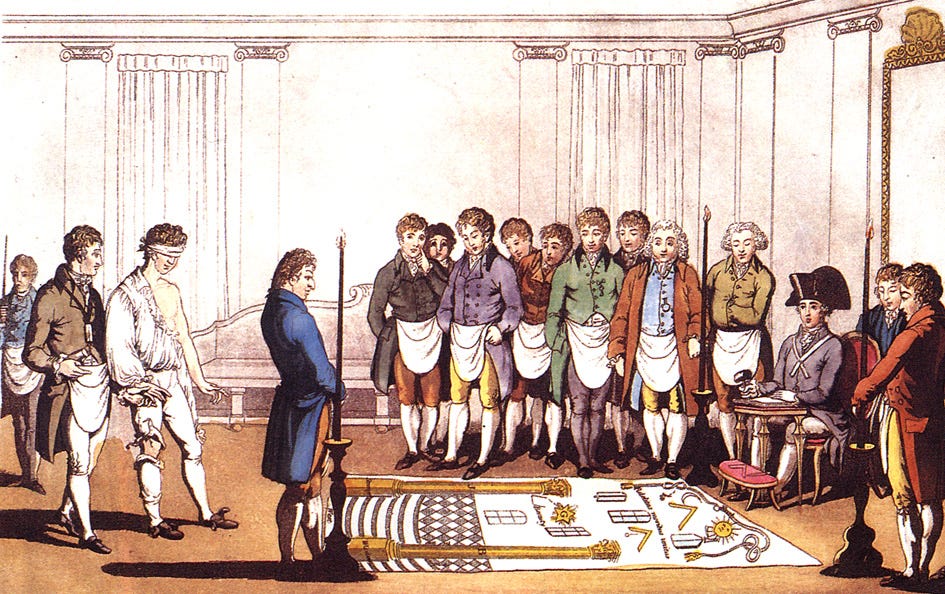
The week’s theme: Regenerate me
I wrote this piece during our first slow read of War and Peace in 2023.
Listen to this tangent:
Run, little man. Run as fast as you can.
Run from the war before it gobbles you up. Run from your death and run for your life, past squabbling generals and starving men. Past battles lost, they said we won. Run, run, run.
Run little man, from the soirée, the salon. The banquet and ball. With the bargain bin Bilibin, Prince Ippolit, charming us all. Your wife cold as stone – the smile of winter on whispering lips. Run, run, run.
Your life is a jacket, a boot, a hat. The shirt on your back. The ring on your finger. Your epaulettes. Take them off.
Leave them behind. The river is deep and the river is wide. You must swim naked, you must swim blind.
Little man, what do you hate? My life.
What do you love? My life.
What do you fear? My death. Run, run, run.
Regenerate me. Make me free, from the war within and the war without. Give me peace in my heart, give me purpose. Regenerate me.
I was an idiot, I am a fool. Here are your symbols and secrets. Your lesser and greater light. King Solomon's hammer. His mallet. His sword, piercing my flesh. I'll bleed, I'll kneel, I'll do whatever it takes. Regenerate me.
Regenerate life. The sun, the moon. The seed in the soil and the word on the wind. My father's back in the saddle, back in the war. My father's rage is deep in me, bellowing. Out! Go! Gone. Run, run, run.
My son. My son. Hear your cry. Feel your fever. I'll do whatever it takes. I'll right my mistakes and write my life again to begin again in you. Only live. Don't die. Please don't die.
The nights are long now, and sleepless. And cold now, and restless. And she's gone. The past's gone. Crumpled in letters thrown on the fire.
The future before us is hidden. A blindfold. A curtain, covering the cot. My son's gone. The future recedes, like the tide going out.
It was a trick of the eye. Life's cruel lie. My son is alive. And I am alive. I want to hold his heart to mine. To hold him and never let go. But I dare not. I cannot.
I am frozen in this moment. Between life and death. Past and future. Regenerate me.
Run, run, run.
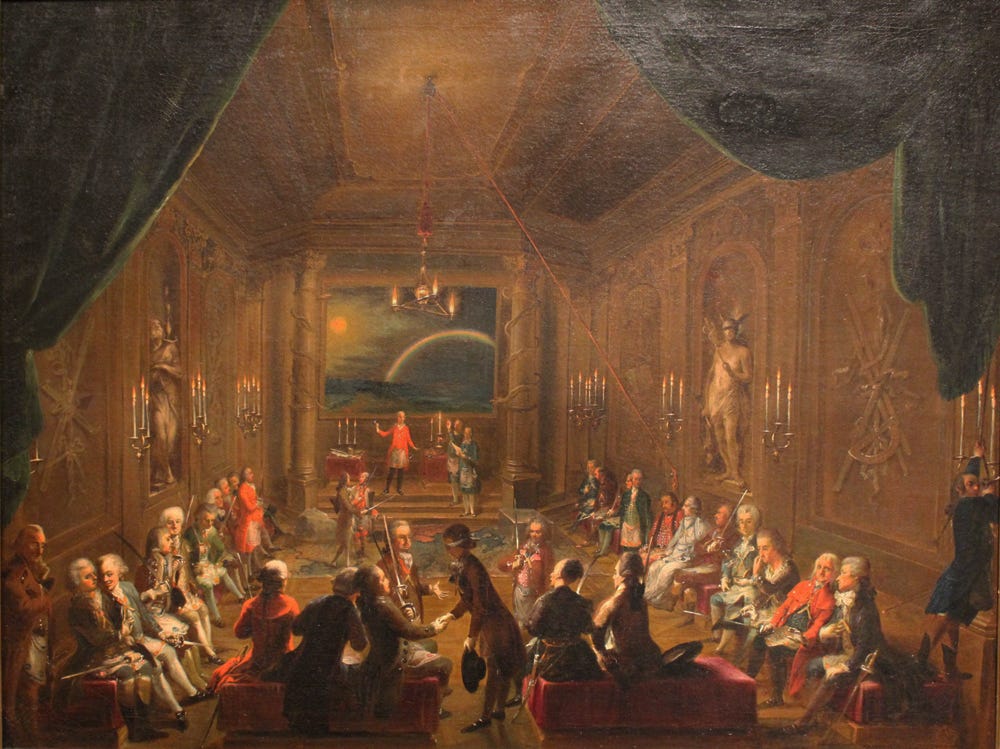
War and Peace Meetups
Before we get stuck into the chapters, does anyone want to organise a local War and Peace meetup?
has posted a thread suggesting a meetup for people in southern England:Reply in the comments if you are interested in a meetup near you. If there is lots of enthusiasm, I’ll put out a separate post to help us organise local groups.
Chapter 3: Regeneration
Pierre is initiated into the Brotherhood of Freemasons. In the arcane and bizarre ceremony, he says he desires “regeneration” and is especially taken by the aim of improving mankind. Of the seven virtues, he conveniently forgets discretion. Although he told Bazdeev that he hates his life, he loves it too much to embrace the seventh virtue: the love of death. As is often the case, the proceedings include a generous donation of all valuables. Finally, his greatest passion? Women, apparently.

Footnote: The Imitation of Christ
In this chapter, Pierre is reading The Imitation of Christ by the 15th-century German-Dutch theologian Thomas à Kempis. This devotional book is one of the most influential Christian texts. It focuses on the interior life and a withdrawal from the world of sin. It contains dialogues between Jesus and his disciple, in which Jesus says:
Make clean the mansions of your heart. Shut out the whole world and all its sinful din and sit as a solitary sparrow on a housetop and, in the bitterness of your soul, meditate on your transgressions.
I imagine these words profoundly affecting Pierre.
With the exception of the Bible, The Imitation of Christ has been translated into more languages than any other Christian text. Written before the schism of the Reformation, it was highly regarded on both sides of the Catholic-Protestant divide. Thomas More, the author of Utopia, admired The Imitation of Christ, as did Ignatius of Loyola, the founder of the Jesuits. The book aided the spiritual conversion of John Wesley, the founder of Methodism.
In The Mill on the Floss, George Eliot's heroine turns to The Imitation of Christ for guidance. Tolstoy read and admired Eliot’s novels, adding them to his list of books that influenced him when he was writing War and Peace and Anna Karenina.
Later in life, Tolstoy wrote The Kingdom of God is Within You, setting out his own religious beliefs. Tolstoy emphasised the foundational importance of universal love, and this book greatly influenced Mahatma Gandhi and his philosophy of nonviolent resistance against British colonial rule.
Tangent: Know thyself
‘It must be so, but I am still so weak that I love my life, the meaning of which is only now gradually opening before me.’
I love these chapters and Pierre’s tentative steps towards a greater self-awareness. Within two chapters, he says, “I hate my life” and “I love my life”. An apparent contradiction, but a productive one: he has a great appetite for life, but it creates so much unhappiness in him. His soul contains none of the cynicism of St Petersburg society. He will never be satisfied with the sort of success Boris is chasing. And although he thinks the love of his life is a weakness, I am convinced it is one of his great strengths.
But Pierre is a long way from understanding himself. He says “women” are his greatest passion and vice. Perhaps he is thinking of Hélène’s marble bosom and the brothels he visited with Anatole and Dolokhov. I am not convinced, and I think his problems lie elsewhere.
But keep searching, Pierre. For yourself and for us.
Chapter 4: A rite of passage
Pierre’s initiation rituals are completed, in which he sees the lesser light and receives a drawer full of symbolic gloves. He is aware of his own shame, the Grand Master's embarrassment, and moments of awkwardness in the room. But he pushes aside all doubts: “He could not stop halfway.” And he went home “as if he had returned from a long journey … completely changed.” But perhaps his long journey has only begun.
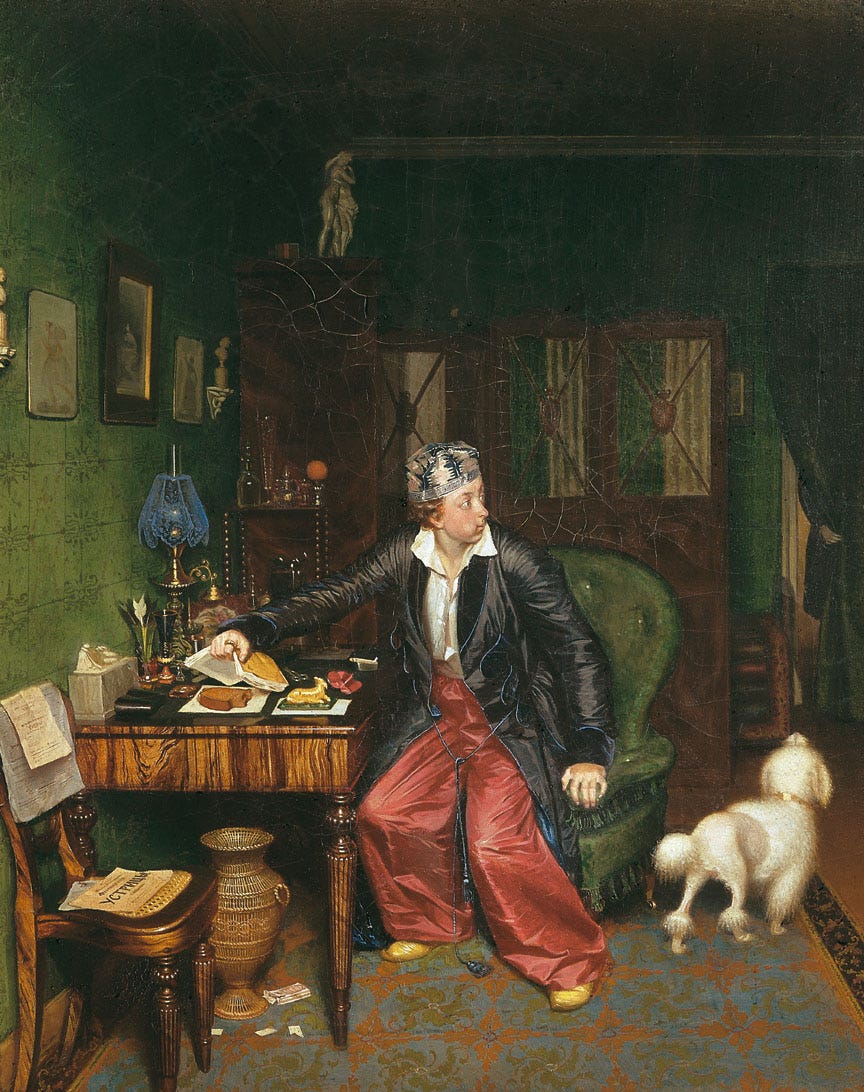
Tangent: The alchemy of life
‘Where am I? What am I doing? Aren’t they laughing at me? Won’t I be ashamed to remember this?’
To most of us, the masonic rituals may seem strange, even ridiculous. But the motivation that underlies these rituals is universal: the desire to restart, reset and renew. No life is complete without them, even if it is simply the unspoken faith in your morning coffee.
At various moments in our lives, we undergo rites of passage to assume new roles and identities. We become part of new communities, real and imaginary. And this moment of transition is marked by crossing a threshold, a liminal space, neither one thing nor the other. Pierre, in the darkness, feels foolish and fulfilled. Life is wonderful and confusing. Often simultaneously.
His liminal experience in the Masonic lodge mirrors Nikolai’s otherworldly transformation in the presence of Natasha singing. “Oh, how that chord vibrated, and how moved was something that was finest in Rostov’s soul! And this something was apart from everything else in the world and above everything in the world.”
Both men feel transformed, at least for a moment. But they must both discover that the ritual is not the journey. Change is slow, complicated and hard-won. And yet the ritual is essential to the alchemy of life.
Question: What is the strangest ritual you have participated in?
We have at least one Mason in our daily chat and many relatives of Masons who have shared their stories. It’s been great hearing from you! But the world is full of rituals, individual and collective.
“Strangeness” is subjective, but let us know what rites and rituals have made up your lives. I once went looking for the meaning behind a snakebite. It led me to a strange night with ayahuasca and a vision of Death. Every time I see the sea, I feel the need to tell it my troubles. The waves have a way of taking the worries from me. And I am never fully human until the first coffee of the day.
Humans are strange. Wonderfully so.
Chapter 5: Finding your voice
News of his duel has reached the emperor's ears, and Pierre decides to leave Petersburg to visit his estates. But Vasili stands in his way, playfully trying to patch up any misunderstanding between Pierre and Hélène. Pierre realises how hard it is for him to say what is not expected. But with whispering fury, he tells Vasili to go. Are you ill? says Vasili Kuragin. No, not ill. Pierre’s just finding his voice.
He blinked, went red, got up and sat down again, struggling with himself to do what was for him the most difficult thing in life—to say an unpleasant thing to a man’s face, to say what the other, whoever he might be, did not expect.
Tangent: Conflict and confrontation
I always relate to Pierre. I have strong opinions but hate confrontation and argument. I fear voicing my disagreement and worry that it will come out as a furious whisper rather than a calm and cogent argument.
But enough of my troubles. Two refusals of Kuragins bookend Pierre’s spiritual journey. He tells Hélène to get out of his life and whispers at her father to go and leave him. He clearly finds both conversations terribly difficult, but I am glad to see him cut himself free and begin his own journey without them.
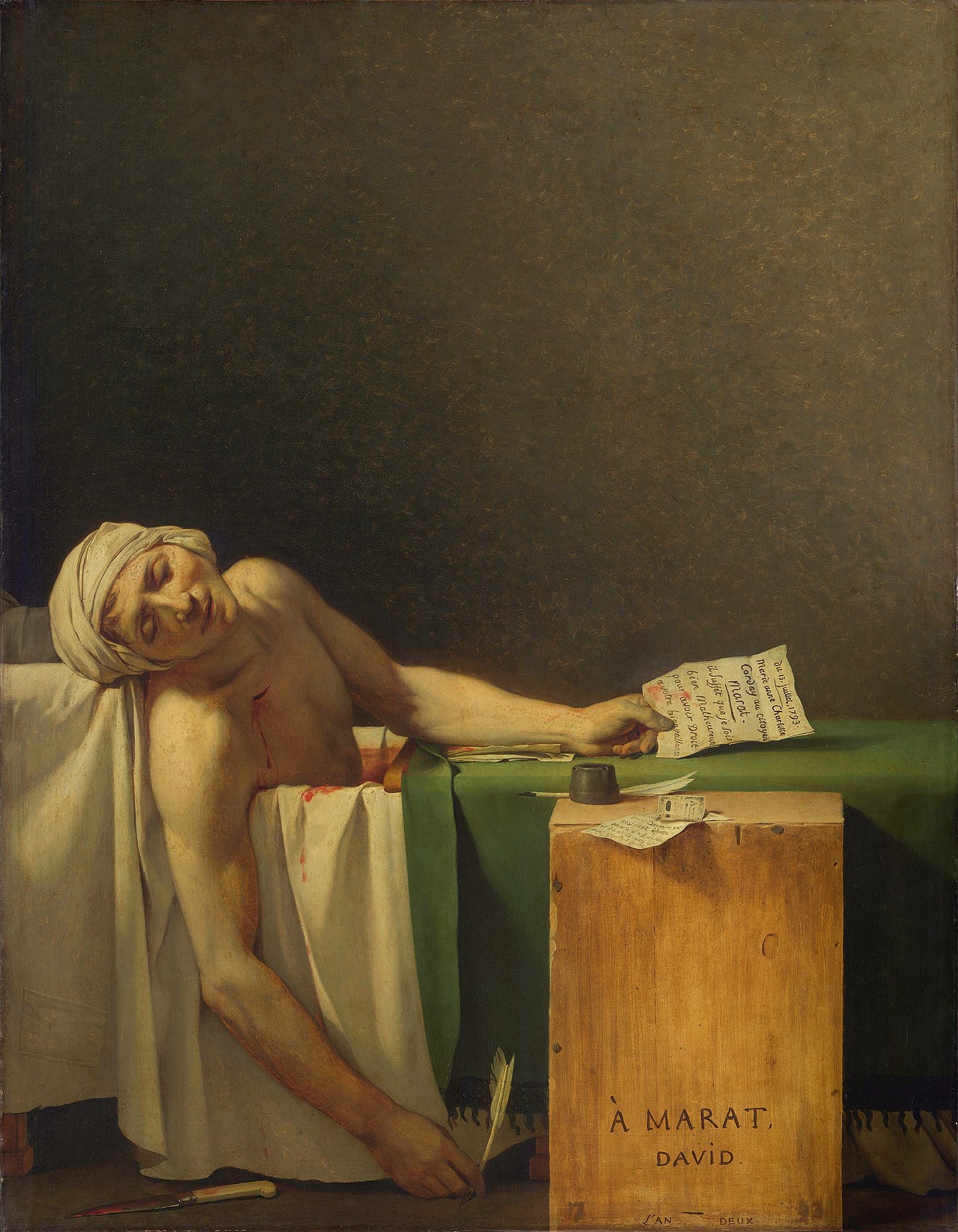
Chapter 6: Getting on
Anna Pavlovna’s soirees are really going downhill. The headline acts now include the ‘charming’ Prince Ippolit, a ‘man of high merit’ called Mr Shitoff, and Boris. The lovely Hélène has re-launched herself as a woman of misfortune, stoically bearing the cross of her bloodthirsty, jealous husband. Boris is getting on in society by dressing well, knowing all the right people, and not expressing opinions. The marble queen catches his eye. They exchange business cards and admire each other’s name badges. It must be love.
Pierre • Hélène • Anna Pavlovna • Boris
Footnote: He posed as a sort of Marat
Something Tolstoy does really well is show how society paints very simple caricatures of people. We, the readers, know the complexity of the situation. But now Pierre is “insanely jealous”, subject to “fits of bloodthirsty rage.” Anna Pavlovna says “he posed as a sort of Marat” when we first saw him in the novel. Jean-Paul Marat was a radical voice and pamphleteer during the French Revolution. The comparison is farcical. Marat was a ferocious defender of the most violence excessses of the revolution. Pierre’s ideas are muddled and mild. But Anna Pavlovna also claims she had nothing to do with matchmaking Pierre and Hélène. If you recall, she played a very active role in this disastrous union.
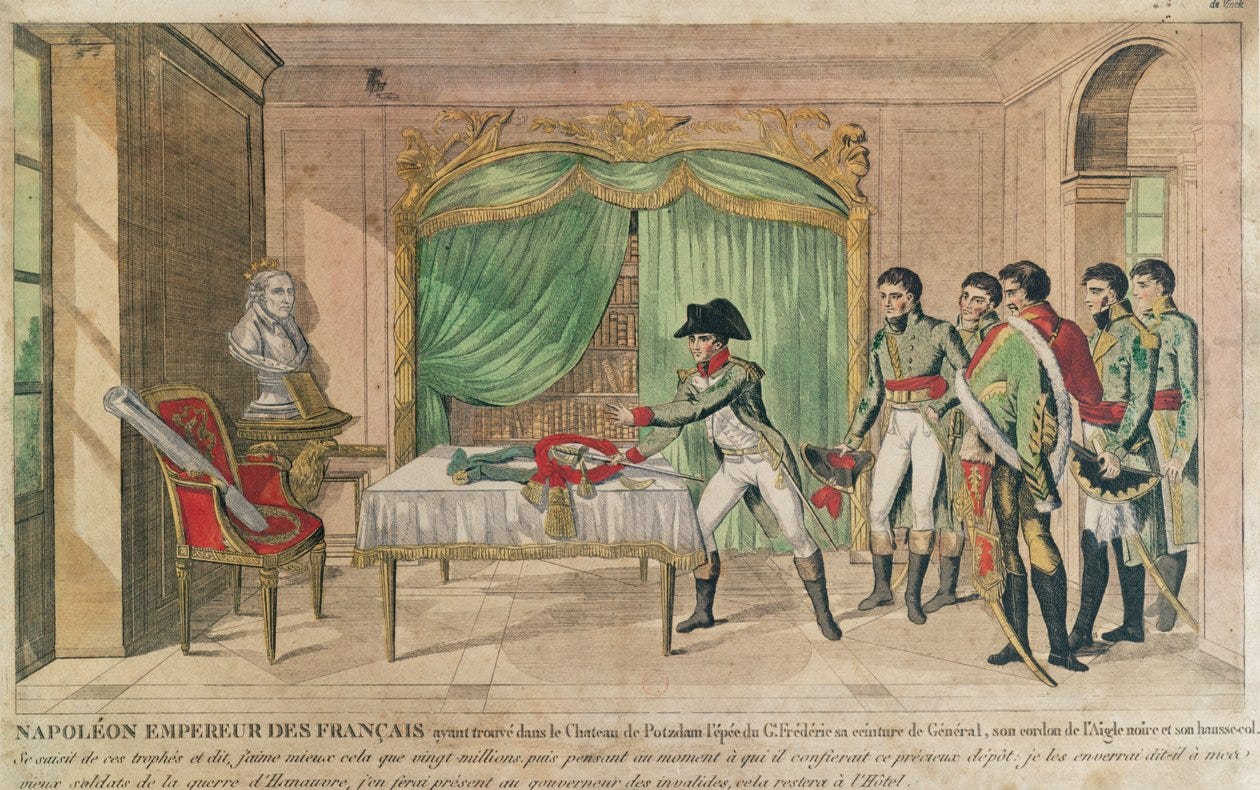
Chapter 7: Bargain bin Bilibin
Fate decrees that we must now endure one of Prince Ippolit’s jokes. He starts with the punchline. And you’ll need the endnotes to make sense of the rest. Boris reads the room and perfects a smile that can be either ironical or appreciative. This lad will go far. And it appears Hélène has poached him for her own rival salon.
Ippolit • Boris • Hélène • Anna Pavlovna
All Tolstoy’s Parties!
Last we heard from our entertainment correspondent, he was sitting down to dinner with the Kuragins. I was concerned. So, I am relieved to report that our man in Moscow is still in action and enjoying life’s big fish:
Footnote: Le Roi de Prusse
It’s always a bad sign when you have to explain a joke. To work for the King of Prussia is to work for nothing, to knock yourself out for no good reason. The expression comes from the French dissatisfaction with the peace treaty ending the War of the Austrian Succession in the 1740s.
Now, it is Russia’s turn to feel like its alliance with Prussia is bringing it nothing but grief. In 1805, before Austerlitz, Russia convinced Prussia to enter the war on its side. But instead of Prussia coming to Russia’s aid, Russia has been forced to come to the support of its new ally.
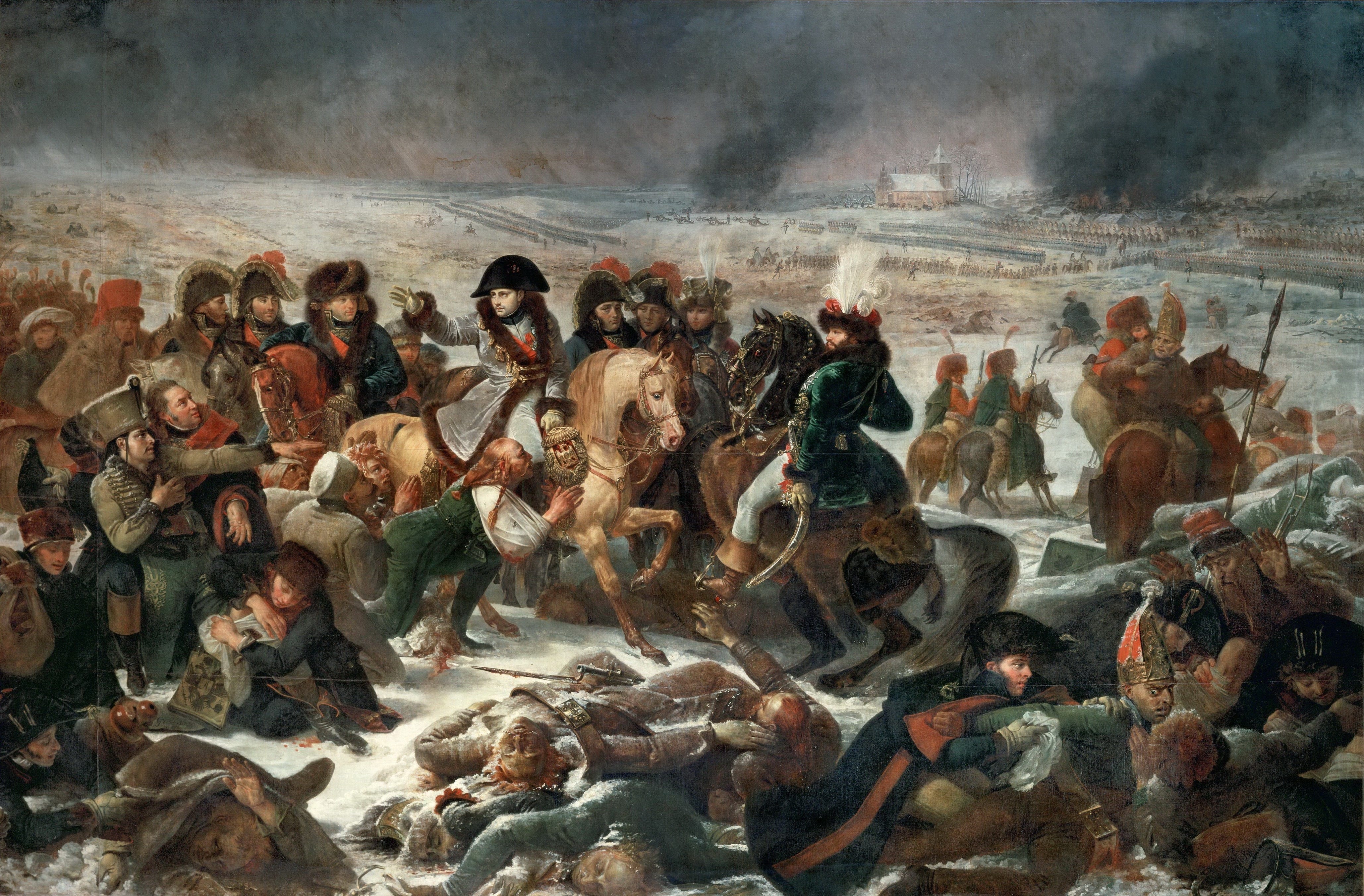
Chapter 8: Fathers and sons
Andrei and his father have traded places in the war. Nikolai Bolkonsky has found new energy and strength as a recruitment commander. His son has moved to his new estate, Bogucharovo, to sit the war out and escape the oppressive memories at Bald Hills. His child, Nikolai, has a fever and neither Andrei nor Marya are getting much sleep. So they argue. When his father writes to him with instructions, Andrei thinks: “No, pardon me, I won’t go now till the child is better.”
Andrei • Marya • The old prince • The young Nikolai
Chapter 9: All that matters
Andrei reads Bilibin’s letter about squabbling generals and marauding soldiers. He is disturbed by its effect on him, pulling him back to his former life. Then, he is terrified that this may have distracted him from his vigil over the sick child. The fear that baby Nikolai is dead is unfounded. The fever has passed, and sister and brother share a moment of peace from the world beyond.
Bilibin • Andrei • Marya • Little Nikolai
War and Peace Poetry Slam
In this week’s chat,
challenged us to a poetry slam. was the first to take the bait:There once was a girl named Helene
Who wowed all the Petersburg men.
"Do come before nine,
We'll wine and we'll dine,
And, promise, be in bed by ten!"
Paula came back with this:
There once was a man named Pierre
Who gave old Moscow quite a scare
He went to St Pete
And found by his feet
One felt boot that was minus its pair
Arthur was undeterred:
Bolkonsky, his bonnet full of bees,
Liked to beat all his serfs to their knees.
When they shoveled the snow
He cried, "Put it back on the road!
Let Kuragins arrive on their skis!"
Paula:
War and Peace is a very long book
Deserves more than a cursory look
Each day a few pages
Simon earning his wages
With this novel we all undertook.
(Thanks Paula, reminding me that I really need to open that Footnotes and Tangents gift shop.)
calls time on the poetry face-off:Maria, Anatole couldn’t hold her
He’d rather kiss Helenes shoulder
He tried to be discrete
Oops! That was Ippolit!
All while Pierre worships a boulder
Can you do better? Enter your poem in the comments.
Thank you for reading
Thank you for reading and joining me on this slow read of War and Peace.
A quick reminder that this book group is entirely funded by its readers. So, if you have enjoyed this post and found it helpful, please consider a paid subscription to access the bonus reviews of all the parties of War and Peace and start your own discussion threads in the chat area. You can also donate to my tip jar on Stripe. Thank you so much for all your support.
And that’s all for this week. I would love to hear your thoughts in the comments. Have a great week, and I’ll see everyone here next Sunday for more War and Peace 2024.




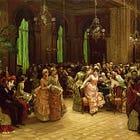
Simon, your “Run, run, run” piece is beautiful and moving and I loved listening to you read it. Thank you for this!
Well, Simon, it was quite a week. Thank you for being our guide through Masonic rituals and family drama. I am glad it ended with the baby's fever breaking. It's a very human end to a week full of human frailities and foibles.